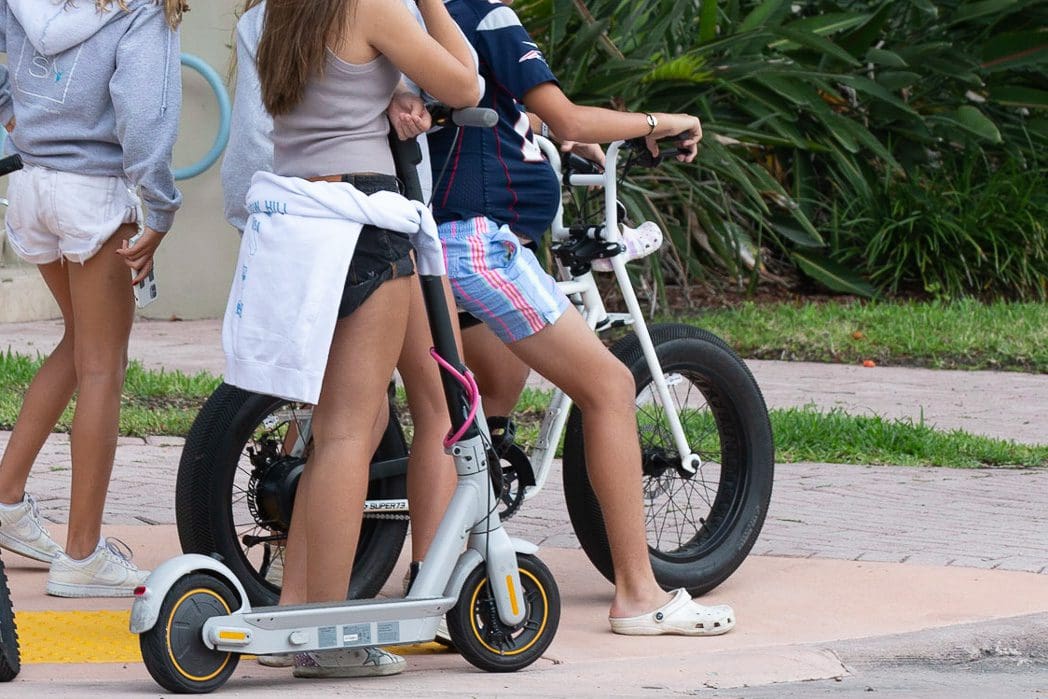Acting on a recommendation from police, Key Biscayne’s Village Council voted unanimously Tuesday to ban the fastest models of electric bicycles from island streets, worried that improper use by teens would lead to tragedy.
“They’re a huge safety issue,” said Police Chief Frank Sousa.
The move came despite misgivings from several council members who said that irresponsible use by a few should not curtail rights for others. But Sousa told the council officers have already responded to one very serious accident and several close calls involving e-bikes, which can travel close to 30 mph.
The proposed ordinance would ban Class 2 and Class 3 e-bikes, which can hit speeds of 20 to 28 mph and can operate fully propelled. But traditional Class 1 e-bikes, which require a user to pedal and max out at 20 mph, would still be allowed on Village streets.
Regardless of class, however, the proposed ordinance would completely ban all e-bikes from Village parks. The civil fine for violations would be $75, increasing to $150 for subsequent offenses. The law would go into effect March 1.
The legislation does not address electric scooters, but officials are hoping the Legislature will allow a change to existing state law that would let municipalities better regulate scooters. Sousa wants the ability to issue civil fines, instead of writing standard traffic citations. Standard citations can lead to a delay of driver license privileges for minors if the citation is not timely paid. The Village has led educational campaigns for youth, but there has been poor parental participation, officials said.
Although the e-bike measure passed unanimously on first reading, several council members worried that law-abiding users were being hurt and suggested that changes may be made before the ordinance becomes part of the Village Code.
“Banning for adults is a tough one,” said Allison McCormick, who has often expressed concern about scooters and e-bikes in the past. “We had a teacher at MAST Academy that commuted that way.”
Council Member Oscar Sardiñas agreed, saying the Village needed to proceed cautiously.
“Banning, it’s just strong language for me, it doesn’t feel right in my gut,” he said. “I don’t want to have unintended consequences. I want to make sure that we have our freedoms to have these.”
Council Member Brett Moss understood the concern, but said banning certain types of e-bikes still left plenty of transportation alternatives.
“When you ban something, you also think, ‘are there any alternatives?’ My kids wanted one of these. I said absolutely not. You pedal, you get a workout, you get to the same place. There is an alternative.”
Council Member Ed London noted that because the Village would still allow Class 1 e-bikes, residents could still use the technology. “ I don’t really think there’s any kind of hardship,” he said, noting the speed difference is only eight mph and that the village speed limit is 20 mph. London said he’d prefer a phase-out to allow people who bought faster e-bikes to convert them to Class 1 status.
E-bikes, which can cost upwards of $2,100, have been growing in popularity in the U.S. after a slow start. Some 880,000 were imported last year, said Ed Benjamin, the head of the Light Electric Vehicle Association, a trade group. He said municipal regulation of e-bikes is not unheard of, but rare.
“Are they safe? That’s a complicated issue,” he said. “Is the vehicle directly at fault, or is what’s at fault an operator that’s ignorant or careless?”
Fire Danger
The devices, however, have drawn attention recently for another danger — the risk of sudden fire.
In an article this week, Consumer Reports found a growing concern nationwide about poorly-made lithium-ion batteries that have sometimes erupted into flames. The fires have led to deaths, lawsuits and expensive insurance claims, but because the devices are classified as bicycles, they are regulated by the Consumer Product Safety Commission, which has weak enforcement powers.
In Key Biscayne, Fire Chief Eric Lang said the department has responded to two battery fires, including an e-bike fire last year — saying the fire risk is a real concern.
“If you have a fire in a parking lot, it’s one thing,” Lang said. “If you have a fire from a scooter or an e-bike in an apartment, it’s a totally different scenario,” he said, recommending that both e-bikes and scooters be stored outside in a well-ventilated area.
Invest in Local News for Your Town. Your Gift is tax-deductible
Tony Winton is the editor-in-chief of the Key Biscayne Independent and president of Miami Fourth Estate, Inc. He worked previously at The Associated Press for three decades winning multiple Edward R. Murrow awards. He was president of the News Media Guild, a journalism union, for 10 years. Born in Chicago, he is a graduate of Columbia University. His interests are photography and technology, sailing, cooking, and science fiction.



